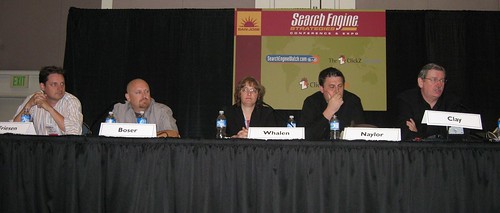People love controversy, and that was clearly in evidence at this SES session covering the most controversial of SEO debates, White Hat versus Black Hat. Moderator Matthew Baily of SiteLogic and his crew of experts from both sides spoke to a standing-room only crowd. Panelists included:
- Greg Boser of 3 Dog Media
- Todd Friesen, Director of SEO at Range Online
- Bruce Clay, President of Bruce Clay, Inc.
- David Naylor, SEO of Bronco
- Jill Whalen, CEO of High Rankings
The speakers were, for the most part, vague about what color their hats were, but each expert drew upon their own professional experience, techniques and observations when responding to questions posed by Matthew and the audience.
What is Black Hat SEO?
Jill and Bruce kicked off the debate by responding to this question. Bruce stated that both the search engines and clients decide what is white versus black. White SEOs tend to play in the middle, Greys at the edge and Black Hats out of bounds. He believes Black Hat techniques are truly defined by whether or not they hurt the client.
Jill defined black hat as a technique designed to trick the search engines into believing a site is most relevant. She further went on to state that legitimate businesses shouldn’t need black hat techniques to rank.
What is White Hat SEO?
Matthew selected Greg, Todd and David to respond to this query. Todd began by polarizing the two sides, stating that anything damaging to a client is black hat while following Google’s regulations to the letter is white. He then clarified his position, by saying that the true color of SEO actions depends on the vertical. If everyone in a given industry is using ‘Black Hat’ techniques, are they really Black Hat?
“White Hat is a code name for SEOs with no game,” Greg said.
David contributed to this idea by comparing Black Hat techniques to a Porsche, whereas white hat techniques are very slow to see results. White Hats ensure all their tactics are within bounds, while Black Hats do whatever it takes to get links and high rankings.
Black Hat carries certain risks. Does White Hat SEO have any risks?
From this question the panelists took a look at which tactics would be defined as Black versus White Hat. Bruce argued that, because the search engine guidelines aren’t clearly defined, White Hats do overstep boundaries every now and then.
Those on the Black Hat side of the debate argued that tactics are designed to test and find the boundaries, not necessarily overstep them. Greg also pointed out that the majority of “Black Hat” firms don’t perform aggressive tactics without client knowledge.
Several speakers brought up the client side of SEO, indicating that sometimes the clients overstep bounds without SEO knowledge and make mistakes that are detrimental to their business.
As this question wrapped, Matthew opened the panel up to the audience for questions.
How do SEOs explain the benefits and risks of Black Hat vs. White Hat SEO to clients?
Earlier in the debate, Greg had mentioned a two-tiered strategy his firm often used: performing Black Hat techniques initially to boost client visibility while simultaneously laying the groundwork for a solid White Hat SEO campaign. He reiterated that a firm should explain both approaches to clients, including the benefits, drawbacks and risks, so that if a client does move forward with either they are aware and accountable.
The panelists also explored more ‘legitimate ways’ of getting an initial boost, such as Yahoo! Paid inclusion, pay-per-click campaigns or hiring a traditional PR firm.
Is there a White Hat approach to affiliate programs?
The response to this question quickly morphed into a discussion of large corporations and their sites’ supposed immunity from Google sanctions. While Bruce argued that large corporations had the most to lose from Black Hat backlash, both Greg and Todd argued that larger corporations faced virtually no consequences whereas smaller companies could lose everything. Several panelists discussed BMW’s short-lived banning due to some overseas Black Hat tactics.
In a surprise appearance, Matt Cutts stepped up to the microphone to defend Google. Matt claimed that big corporations are by no means immune to Google sanctions, and several big companies have had all or portions of their sites banned due to inappropriate techniques.
Do Black Hat techniques attempt to deceive searchers?
Black Hat defenders were quick to point out that SEO on both sides must still answer to the bottom line. Todd observed that companies are ultimately looking to sell their products, and sites must be seen by the appropriate target in order for this to happen. Black Hat isn’t about deceiving the searcher, but rather making it more likely a searcher will find a specific company within their search query.
In listening to the panelists’ responses, it is clear that the definition of White and Black Hat SEO is constantly changing, depending on the industry in which one is operating, the latest set of search engine guidelines and a number of other influencing factors. Though the speakers were sometimes at odds over responses, all had respect for one another and their opinions. And all were able to agree on one point: whether Black or White Hat, SEOs that are bad at their jobs are the ultimate offenders.
Check out the rest of the TopRank Teams’ posts on the SES San Jose conference on the TopRank Online Marketing Blog, and view more photos from the TopRank Team at TopRank on Flickr.



